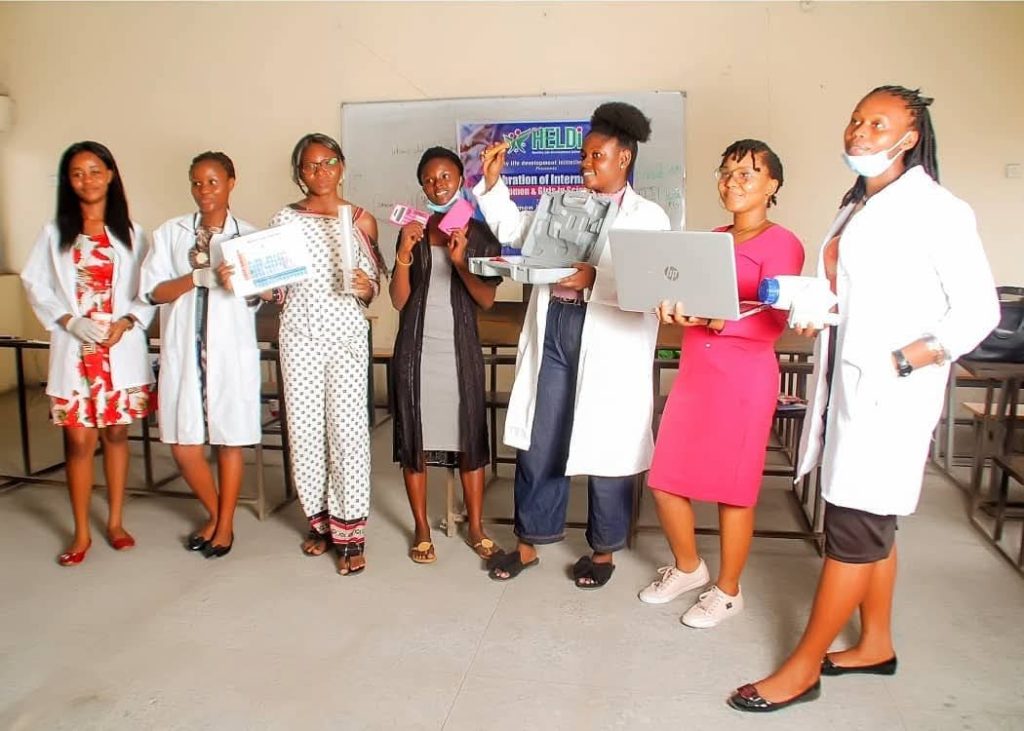By Ignatius Chukwu
A gender-defence group has come out to campaign for effective participation in the International Day of Women and Girls in Science, celebrated annually on February 11th.
According to the Coordinator, Dr Mfon Utin, the organization is committed to the well-being of women and girls.
Dr Mfon said the Healthy Life Development Initiative (HELDi) stands in solidarity with global efforts to promote gender equality in STEM.
In a statement on Monday, February 10, 2025, to boost the lobal day the next day, Dr Mfon said: “We urge women and girls to confidently pursue careers in STEM, breaking barriers and challenging norms.

“We call on relevant stakeholders and organizations starting from local communities to foster inclusive environments that encourage women’s participation in scientific decision-making.”
The Coordinator also urged the Nigerian government to create more opportunities, improve access to technology, expand engineering education, and provide sponsorships for women and girls in STEM, ensuring they have the resources needed to achieve their goals.
“Additionally, we advocate for policies that enforce equal pay and establish monitoring mechanisms for STEM funding and sponsorships for women and girls. We also appeal to international organizations for greater support in promoting STEM education and careers for women and girls in Africa, especially in Nigeria.”
Speaking on breaking barriers: empowering women and girls in STEM for a sustainable future, she said the ‘International Day of Women and Girls in Science’, celebrated annually on February 11th, is a global initiative that recognizes the invaluable contributions of women and girls in Science, Technology, Engineering, and Mathematics (STEM).
The 2025 theme, ‘Women’s leadership in science as a new era for sustainability’, she said, emphasizes the importance of empowering women to take leadership roles in scientific advancements that drive sustainable development.
She regretted that despite progress toward gender equality in education and the workforce, women remain underrepresented in scientific fields globally, with only about 30% of researchers worldwide being women. “This disparity is even more pronounced in fields like engineering, physics, and computer science, where barriers such as limited access, societal norms, and unequal opportunities persist.”
She said the day raises awareness of these challenges and promotes initiatives aimed at closing the gender gap in STEM by fostering more diverse and innovative scientific community.
She mentioned Marie Curie from Poland/France as the first woman to win a Nobel Prize and remains the only person to have won in two different scientific fields; Physics and Chemistry.
She also listed Ada Lovelace from the United Kingdom regarded as the first computer programmer, having laid the foundation for modern computing. Prof. Wangari Maathai from Kenya was a Nobel Peace Prize-winning environmentalist, biologist, and advocate for sustainable development.
In Nigeria, she went on, many women have taken on leadership roles in science and have made significant contributions to their fields. Prof. Francisca Okeke, a renowned physicist, has been a strong advocate for increasing female participation in STEM.
Dr. Dora Akunyili, as former Director-General of the National Agency for Food and Drug Administration and Control (NAFDAC), played a critical role in ensuring drug safety in Nigeria. Dr. Adebimpe Orelaja, an esteemed academic and researcher, has made notable contributions to chemical sciences, while Dr. Adaeze Oreh, the current Commissioner for Health in Rivers State, has demonstrated outstanding leadership in public health.
She said sharing these stories is to enable young girls to gain tangible examples of what they can achieve in science, helping to break down societal and cultural barriers that discourage them from pursuing STEM careers.
“Education plays a crucial role in bridging the gender gap, and the Nigerian government, schools, and institutions must create environments where girls feel supported and empowered to explore STEM fields.
“Several global and regional initiatives support women in STEM, including ‘Girls Who Code’, which teaches young girls coding and programming skills; TechGirls, a U.S. Department of State initiative that provides hands-on STEM experiences; and the African Women in Science and Engineering (AWSE), which offers mentorship, scholarships, and resources for African women in science and technology.”
According to the HELDi coordinator, for decades, societal norms, especially in Africa where Nigeria is no exception, have reinforced the belief that certain scientific fields, particularly engineering and physics, are meant for men. Even for the girls who break these barriers to study STEM, many struggle to secure jobs, and those who do often face unequal pay.
“The International Day of Women and Girls in Science challenges these stereotypes by showcasing the diverse contributions of women across various scientific disciplines.
“Recognizing the importance of gender equality in STEM, governments, institutions, and organizations worldwide are implementing policies to support women, including equal pay policies, paid family leave, funding for women-led research projects, and leadership training programs.”
With a strong focus on gender equality and equity, she said it is essential to provide women with the necessary resources, mentorship, and opportunities to thrive in science, ensuring that scientific advancements benefit from diverse perspectives. “Equality knows no gender, and by continuing to inspire, engage, and support women and girls in STEM, we can build a future where science and innovation are truly inclusive, creating a brighter and more equitable world for all.”
$$







